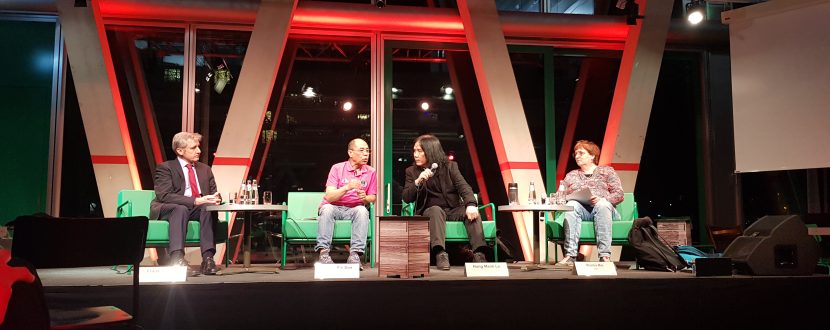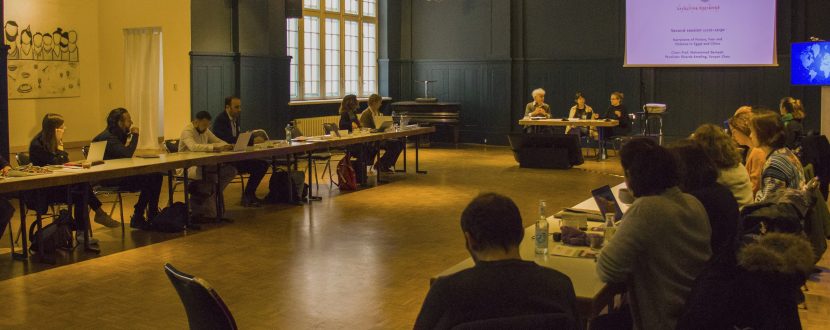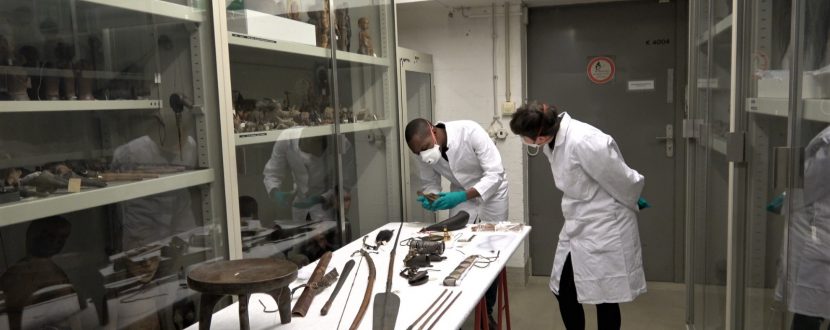Affect, Politics, and Religion in Iceland Religion in politics is a contested field even without taking its affective and emotional dynamics into account. But exactly this was the aim of our workshop Affect, Politics, and Religion (held by Ricarda Ameling, Aletta Diefenbach, and Antje Kahl) that took place at the end of July 2022, for which … weiterlesen
Affective societies, affected scientists! 5 Fragen an Prof. Dr. Birgit Sauer

In der Interview-Reihe „Affective societies, affected scientists!“ beantworten Neu-Mitglieder, assoziierte Kolleg:innen und Wissenschaftler:innen auf Stippvisite oder mit längerem Aufenthalt im Sonderforschungsbereich „Affective Societies“ Fragen zur Affektivität und Emotionalität in Wissenschaft und Gegenwart. Heute stellen wir Prof. Dr. Birgit Sauer vor. Sie ist Professorin für Politikwissenschaft an der Universität Wien und unter anderem Sprecherin des Forschungsschwerpunkts … weiterlesen
Über ohnmächtige Wut und den Elefanten im Raum: Ein engagierter Zwischenruf

Sonst rauchen wir nicht, aber nach der Veranstaltung rauchen wir schweigend nebeneinander. Uns fehlen die Worte, sodass die Zigarettenlänge eine Möglichkeit ist, eine miteinander geteilte Irritation zu begreifen. Was nach dem taz-Talk „Abschiebung nach 36 Jahren?“ bleibt, ist eine ohnmächtige Wut. Ein Gefühl, das sich auf eine tief verankerte Ungerechtigkeit bezieht, die Teil unserer Gesellschaft … weiterlesen
Divisive Emotions/Uniting Emotions: Brexit, Affects, and Contemporary Fiction

‘Are you British or European?’, ‘You are paying too much for your weekly shopping’, ‘More Jobs. Lower Prices. Your family is better off with Britain in Europe’, ‘Your household could be £933 per year better off if the UK left the European Union’…—those are only some examples of the messages included on the leaflets and … weiterlesen
Feeling Racist Narratives Travelling Through Europe

Affect, Politics and Religion in Iceland Religion in politics is a contested field even without taking its affective and emotional dynamics into account. But exactly this was the aim of our workshop “Affect, Politics, and Religion” (held by Ricarda Ameling, Aletta Diefenbach and Antje Kahl) that took place at the end of July 2022, for which a … weiterlesen
Wandel der Institutionen
Ein Gespräch mit Anja Kerschkewicz vom feministischen Kollektiv Frauen und Fiktion über kollektives Arbeiten, kollektive Ästhetiken sowie Kommunikations- und Führungstools für angehende Theaterregisseur*innen.
Affective Authoritarianisms

Authoritarian and populist leaders have been rising on a global scale for some years now. While Egypt and Turkey slid into dictatorship after considerable public mobilization and revolutionary protests in 2011 and 2013 respectively, seemingly consolidated democracies also experienced substantial political shifts. From India to Hungary, from Russia to Brazil, the number of authoritarian policies, … weiterlesen
Affective societies, affected scientists! 5 Questions to Mohammed Bamyeh
The interview series poses questions concerning the role of affects and emotions in research practice and contemporary society to researchers on short-term visit and associate members of the Collaborative Research Center “Affective Societies”. Today we introduce Mohammed Bamyeh. He is Professor of Sociology at the University of Pittsburgh (USA), and President of the Board of … weiterlesen
Experiencing Colonialism through Visiting Collections

Most of what I know about colonialism and colonial injustice in Tanzania I have learned at school. In the history classes at secondary school, we were taught about the brutal establishment and expansion of first German, later British domination which involved plundering, looting, and the killing of those who resisted colonialism. Although I had learned … weiterlesen
Bodies of Knowledge. Familiäre Manifestationen von Macht

Dieses Essay ist ein Versuch. Der Versuch, die abstrakte Idee eines ‚Undoing mastery‘ – eines Nicht-Beherrschens, Nicht-Wissens, Nicht-Entsprechens – in die Praxis akademischen Schreibens zu überführen. Er ist inspiriert von Julietta Singhs Vorschlag eines ‚un-masterful writing‘ als ‚vulnerable writing‘, als ein verletzliches Schreiben, das persönliche Sequenzen einfordere. Indem die Realität der eigenen Situiertheit im Schreiben … weiterlesen



 ältere Posts
ältere Posts